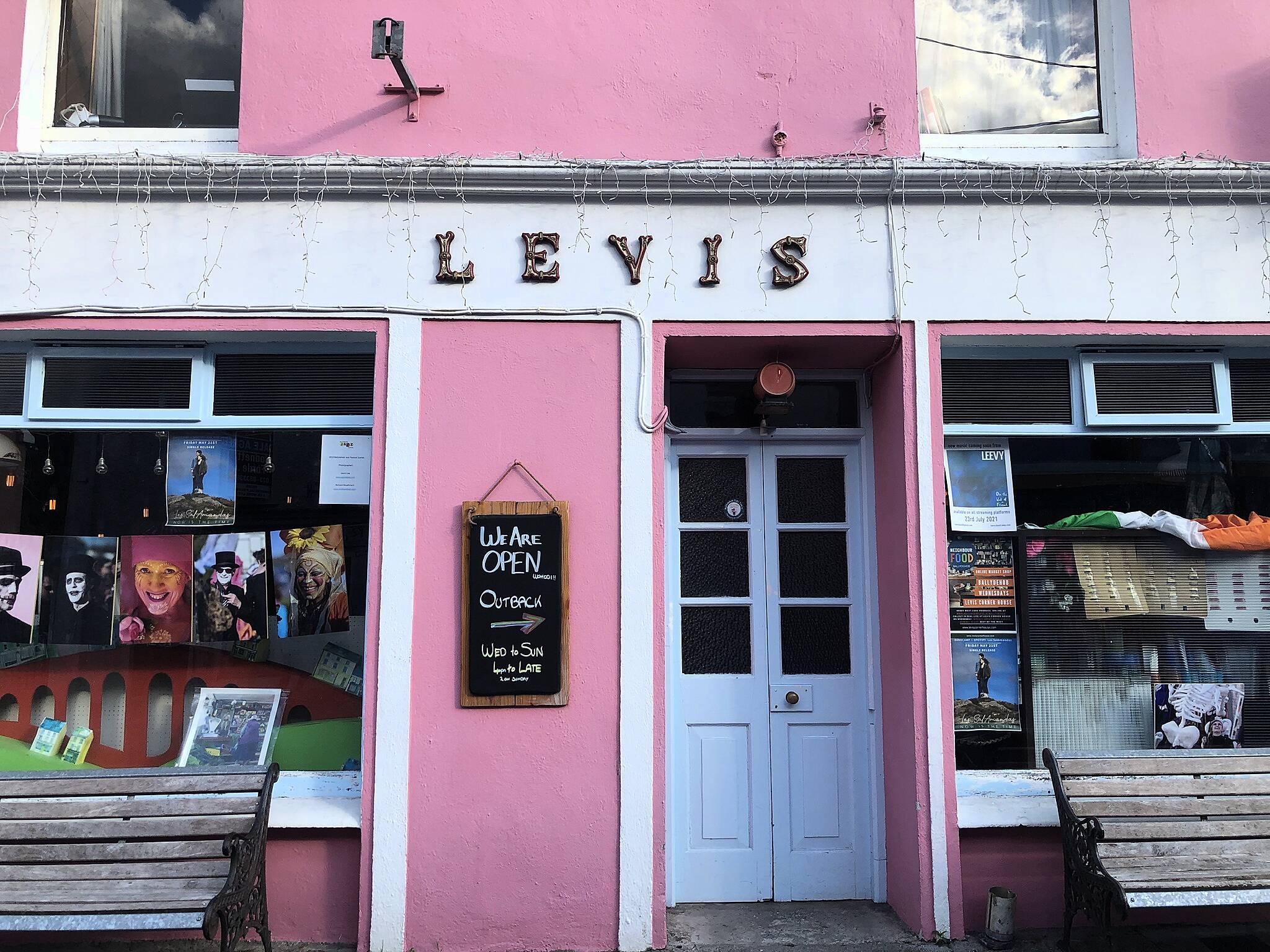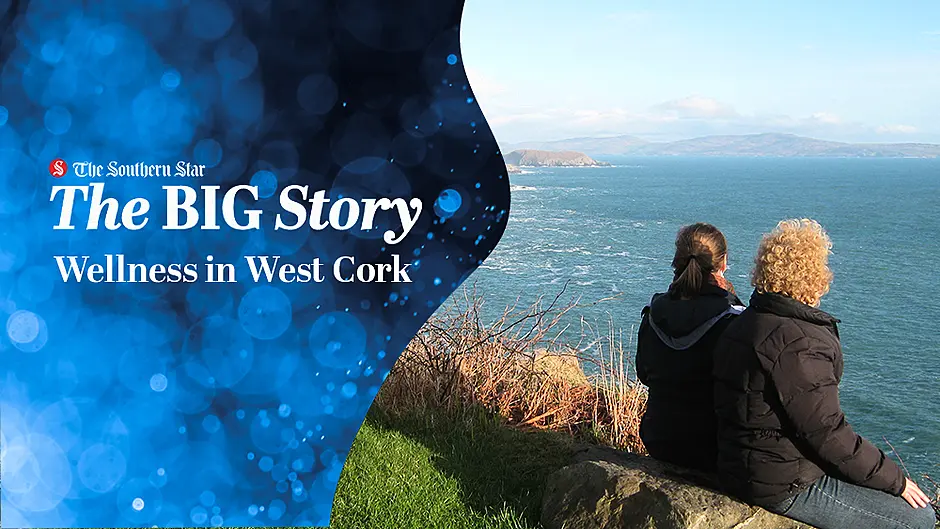Wellness in West Cork is the fourth episode of a new digital series from The Southern Star.
The Big Story, which is exclusive to The Southern Star’s digital platforms, brings readers closer to West Cork’s most important topics.
Episode four is written and produced by Southern Star reporter Jackie Keogh and Southern Star digital manager Jack McCarron.
The Big Read to accompany this piece, written by Jackie Keogh is available by scrolling down this page.
The Big Story is available on southernstar.ie, Youtube and all the major podcasting platforms, including Apple Podcasts and Spotify.
Episode one, Macroom: Choked by traffic is available here, episode two, Bringing Back the Tourists is available here and episode three, Inside Ireland's Greatest Rowing Club is available here.
--
Listen
--
Read
By Jackie Keogh
West Cork has always taken wellness seriously.
Long before there were Tibetan temples, sanctuaries, and luxurious spas, West Cork was the destination of choice for people who had the urge to head west for a day, a season, or a reason.
It was always a place where they could breathe fresh air, rest in its remoteness, and simply be.
The allure of West Cork did not go unnoticed internationally.
Rather famously, the Swiss government purchased Liss Ard Estate, outside Skibbereen, because West Cork was considered to be one of the safest places in the event of a nuclear attack, or accident, due to its prevailing winds and distance from any likely targets.
 Liss Ard Estate
Liss Ard EstateBut it wasn’t always high-end evacuees who journeyed west.
Fit dreamers from Germany, Holland and the UK, mounted bikes and donned backpacks and cycled into quiet, pre-electrified villages much to the amazement of the locals.
Thirty, forty, fifty years ago, these people turned heads, but so too did the holidaymakers who rented horse drawn caravans from a local travel agency in order to roam West Cork.
Today, some of these brightly coloured wagons stand as garden ornaments, as well as monuments to freedom.
Skibbereen-based craft worker and writer, Alison Ospina offers a study of this blended community in her book West Cork Inspires.
‘There is,’ she said, ‘a special energy in the rugged West Cork landscape, which suffuses the artistic mind with inspiration and plays a key role in the creative process.
 Alison Ospina of Green Wood Chairs
Alison Ospina of Green Wood Chairs‘Few countries in Europe offer such wild, empty landscapes such as those of Ireland’s south west corner.
‘In the 1960s and 70s, West Cork became home to an international creative community who fell in love with its clean, safe and creative environment, the beauty and magic of its landscapes and the joy of sharing ideas with like-minded people.
‘This era saw the birth of the Campaign for Nuclear Disarmament, the Women’s Liberation movement, Earthwatch, Greenpeace and the self-sufficiency movement, all groups which inspired many people to live closer to nature, to earn a living making and selling their own handmade products whilst eschewing the excess trappings of modern consumer society.’
Her book focuses on the birth of West Cork’s crafts movement and the fact that it became a haven for artists – not just from Ireland but internationally celebrated artists too.
‘Word spread,’ she said, ‘that West Cork was a beautiful, creative place waiting to be discovered.’
For a long time, Ballydehob was the centre of this creative movement. About 30 years ago, its yoga community made a mark on the landscape by creating An Sanctoir, a hexagonal shaped building in a biodiverse setting.
It is located on the outskirts of the village and is used regularly as a venue for yoga festivals, as well as other community gatherings.
 An Sanctóir
An Sanctóir
For such a small village, Ballydehob is a microcosmic example of how one good idea borrows another.
Soon, it had a wholefood store that is still going strong today.
The latest addition to the village – apart from two excellent new food emporiums, Budd’s and Bally Bia – is the indoor market that takes place every Wednesday morning at the ubiquitous Levis Corner House offering homegrown and homemade produce.

Wellness radiates out. That’s something that is evident in all of West Cork’s towns and villages.
Throw a stone in any direction and you will find a person, a place, or a product that comes with a promise of peace.
The key requirement seems to be a willingness to surrender and an understanding that we are all one.
That inherent impulse can best be illustrated in the true story of one elderly Skibbereen farmer who cycled to the house of a younger man who had been diagnosed with cancer.
The farmer didn’t know the man but felt compelled to knock on his door and utter the phrase ‘we are all one’ before cycling back into the night.
Clearly, connection is key to wellness, and West Cork is awash with stories of people raising money for Cancer Connect, a charity that offers to drive people with cancer to their place of treatment free of charge.
Thousands more is donated each year to the Irish Community Rapid Response organisation, which was founded in West Cork, but has provided all the people of Ireland with its first charitably funded air ambulance.
It also funds a ground service that is well equipped due to the generosity of the community and the willingness of doctors and paramedics to constantly be on call.
Wellness in West Cork comes in many guises. There is the National Learning Network at Donemark in Bantry that provides training and specialist support for people who, for a variety of reasons, may find it difficult to gain employment.
The manager, Cllr Patrick Gerard Murphy explained that whatever a person’s circumstances – whether they are long-term unemployed, have an illness, or a disability – National Learning Network is there to offer help.
 Cork South West’s three TDs, Holly Cairns, Christopher O’Sullivan, and Michael Collins, with Cllr Patrick Gerard Murphy of NLN Bantry
Cork South West’s three TDs, Holly Cairns, Christopher O’Sullivan, and Michael Collins, with Cllr Patrick Gerard Murphy of NLN Bantry
The network has the distinction of being Ireland’s largest non-governmental education and training organisation, offering over 70 different training programmes from art and cookery to computer and business skills in centres across the country.
Potential participants can access courses in a variety of ways such as at their local centre, with a local employer, or even from the comfort of their own home.
All National Learning Network training programmes are funded through The Educational Training Boards or the Health Service Executive, which means most students receive an allowance for participation and can progress to further education or employment.
Patrick said it covers everything from arts and craft to media, catering, tourism, hospitality, the leisure industry, business studies, administration, computer and IT, as well as horticulture and the environment.
Over the past number of years, National Learning Network has significantly increased its development of services for people with mental health difficulties by establishing a Wellness Network with the support of the Health Service Executive.
According to Patrick, everyone has a mental health need at some point in their life, especially in challenging times so the website is a resource for everyone.
As part of the work being done by the Wellness Network, an organisation calling itself ‘49 North Street’ was established in Skibbereen to provide all the people of West Cork with a place where they could go to explore ways of improving their mental health and wellbeing.
In its first year, the number of people using the service on a weekly basis was between 60 and 70. In the midst of a pandemic, demand for the service has increased, but the actual number spaces available at each of the groups and workshops decreased.
An innovative way of ‘opening the door’ to more people was for 49 North Street, together with the Wellbeing Network, to host a West Cork Feel Good Festival to coincide with World Mental Health Day last October.
The aim of the festival was to promote and indeed celebrate community wellbeing, while offering direct links to many of the health and wellbeing resources that are available throughout West Cork.
Rory Doody, a service user – who also works as the area lead for Mental Health Engagement in Cork and Kerry – is an example of how those who use the services need to be involved in how they are designed and delivered.
Rory previously held a number of training workshops at North Street and it was out of these sessions that the West Cork Peer Support Group was established.
It is just one of the groups that meet at number 49. There are many more involving music, the arts and discussion groups too. The location offers people a place where they can come and confidentially share practical advice on living through difficult times.
According to Rory, the onset of Covid-19 has highlighted peoples’ isolation, but he said they respond to that by offering people a way of making connections.
‘The pandemic is hard for everyone, but we are working to help people develop their coping skills – not just through the mental health services, but also by encouraging people to connect, in a meaningful way, with their family, friends and community.’
Kevin O’Shanahan, a nurse specialist in recovery and the arts, explained how engagement in creative activity can be very beneficial to mental health and wellbeing.
He said, ‘There is a lot of digital information on the Wellbeing Network website, but number 49 offers a hub, a physical space, where human connections can be made.’
It’s not the kind of place where the doors are open daily from 9am to 5pm. Instead it offers a weekly programme and people can – in accordance with the new public health guidelines – pre-book a place.
People are tuning in online too to the likes of Oonagh English whose ‘anxious foodie’ posts on social media have made her a poster girl for telling how it is.
Oonagh had the advantage of growing up in the Buddhist tradition where words like compassion and service were used every day, and where meditation was a rudder for one’s journey in life.
 Oonagh English
Oonagh English
Being Buddhist didn’t prevent her from getting depressed or anxious but it did give her tools to effectively manage that stress and anxiety.
She sets great store in kindness and being kind to oneself. It helps with coping. But here, she says, consistency is key.
Oonagh’s Facebook posts, her online blogs and her webinars are repositories of wellness with plenty of tips on how to optimise your mental health using nutrition, meditation and reframing one’s mindset.
The fact that she has the knack of speaking directly to people, and directly addressing their secret or underlying fears, is one of the reasons that people are comfortable taking direction from her.
For example, she would suggest that people ‘manage their energy rather than their time’ because it is easier to focus on the bigger tasks when you have energy.
Want to meditate? Well, there’s no need to shave your head and don robes. Oonagh would probably recommend you start with five minutes a day on cushion because that act, combined with consistency, is where one starts.
Confused by the avalanche of advice on what good nutrition means today? And what’s actually bad for your digestion system and sleep pattern? Oonagh, who is fully trained in all aspects of her business, doesn’t blind people with science.
She might suggest ‘eating the rainbow’ which might sound simplistic but it simply means eating fruit and vegetables of every colour.
The rule of thumb is to eat all the colours in one week and three colours a day.
Simply, hold off on the beige food – the bread, the pasta, the potatoes – and eat an apple or two. Have a punnet of blueberries or gooseberries. Eat a rhubarb crumble – anything that you make yourself and can see the ingredients you are using – instead of the manufactured sweetness that’s as hard as a drug habit to kick.
It’s wonderful to see a young woman speaking to the fact that ‘anxiety need not have agency over your life.’
Elsewhere the Network Ireland West Cork has become a repository of wellness too.
The fact that it is by and for women gives it a unique sorority feel and that’s evident in each of the gatherings. Take for example one event where members were asked to put two coloured Post-It notes on the wall.
One contained a request for help with something, while the other was an offer of support in one’s own area of expertise.
The wonder wall looked rather beautiful. The chat too was energising as people pointed and said things like, ‘You’d be good at this,’ or ‘Here, this is perfect for you.’
During that particular segment of a much larger meeting – which usually covers a variety of personal, promotional, business and financial matters – new contacts were made and skills were shared.
Each year, an awards scheme organised by the West Cork network calls on women – both bosses and employees – to dust down their resumes and enter the competition.
The very act of entering is like stepping up. Everyone who has done it speaks to the fact that it is energising and empowering. In a word, it has taught them to ‘Believe.’
By its very existence, the organisation addresses important issues like female empowerment and gender balance in a way that does not get bogged down in rhetoric.
There is another organisation in West Cork that has at its core a willingness to serve. That’s Dzogchen Beara, a meditation centre at the tip of the Beara Peninsula.
 Dzogchen Beara
Dzogchen Beara
Malcolm MacClancy, the centre director, outlined how in 1973 Peter and the late Harriet Cornish, an English couple, bought the centre with the intention of creating a place of refuge for anybody who wished to escape the chaos of the modern world as they saw it in the 70s.
‘A lot of people were in motion in the 70s trying to find places away that they could create an alternative way of being,’ he said. ‘They had a particular interest in Tibetan Buddhism and a community of people with similar interests began to gather around them and that was the beginning of Dzogchen Beara.’
The centre became a charitable trust in the early 1990s with the intention of bringing the teachings of Tibetan Buddhism to the world at large.
Since then, that is what they have tried to do by offering a space where people can go on long-term retreat, but also by hosting a very open programme.
That sense of openness and inclusivity is evident in the meditation room at Dzogchen Beara, where there is a Buddhist shrine at one side of the room and an altar with Christian symbols on the other.
What you believe is not really the issue, but ‘love your neighbour as yourself’ is there in the mix.
Malcolm said, ‘Ireland isn’t a Buddhist country, but it has always been our wish to bring the wisdom and compassion, which is at the heart of the Buddhist tradition, to the public, to serve the community, to serve the world, and to make these teachings available in a way that is authentic but also relevant to people from all walks of life.’
Highlighting a Buddhist centre is not intended to be an act of endorsement. But like the nearby cable car going to Dursey Island it does have the advantage of being unique.
Today, Dzogchen Beara is one of the biggest employers in the region. It employs 40 people – Buddhist and non-Buddhist alike – in its café, hostel, holiday cottages and shop.
During the pandemic – from March to the present day – an estimated 2,500 people attended the online courses offered by Dzogchen Beara.
Malcolm said, ‘The purpose of these recordings was to meet the needs of people experiencing increased uncertainty, anxiety and grief as the pandemic intensified and the lockdown extended.’
But the truly jaw-dropping aspect of this community within a community is the traditional Tibetan temple that is being built on the site.
Detractors might complain about the €3.6m cost of the project, but this is a labour of love and is largely being funded by donations from members of the Buddhist community worldwide.
An estimated €550,000 is needed to finish the building, but Malcolm is confident that they can raise that by the end of this year and that construction will be finished by the summer of 2022.

‘During lockdown, the team has been working on the preparation of the sacred decoration, which involves testing all the materials to see how it lasts in our harsh marine environment.
‘We also built many models and mock ups of the main shrine and of the traditional Tibetan sacred art and architecture that will adorn the building. From this,' he said, 'the shrines are currently being made and we’re designing the sacred art and architecture.'
A lot of work has also gone into sizing up items such as thrones, brocades, carpets, to get it all just right and all of these are now being made in India.
Regardless of your religious persuasion, or none, the fact that the centre doesn’t have a gate is an indication that it has an open door policy. Pretty much like West Cork.










